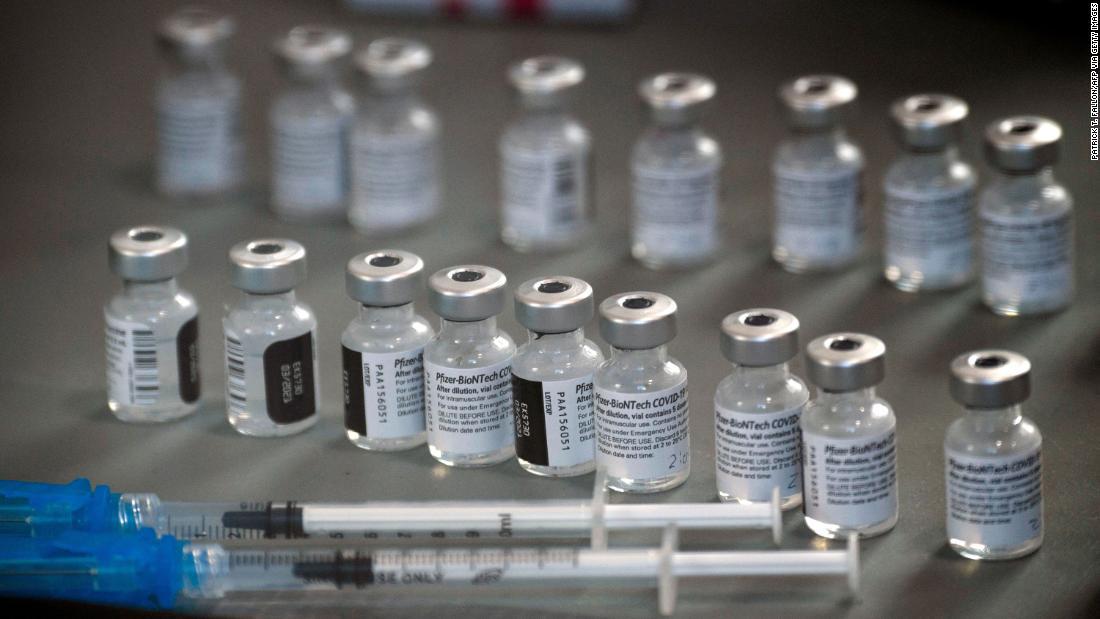Is the booster dose key to ending the pandemic?
5:32
(CNN) -
Vaccine advisers from the U.S. Food and Drug Administration (FDA) have been meeting this Friday morning to discuss whether some Americans need to start receiving booster doses of the coronavirus vaccine.
The meeting, which is expected to last all day, will be packed with presentations.
They will include staff from Pfizer / BioNTech, who argue that there is enough evidence of waning immunity to justify giving people booster doses.
The FDA will present its own opinion on the data that has been submitted to the agency thus far, although written informational materials released prior to the meeting suggest that the agency remains neutral for the time being.
The Vaccine and Related Biologics Advisory Committee is made up of vaccine experts, immunologists, pediatricians, infectious disease specialists, and public health experts.
Three Reports Support Arguments For Pfizer's Covid-19 Vaccine Booster Dose
J&J Says 1:11 Booster Shots Needed
This will be the meeting of FDA advisers
You'll hear first from Dr. Peter Marks, who heads the FDA's vaccine arm, the Center for Biological Research and Evaluation.
Another CBER official, Marion Gruber, will raise the issue of the booster dose.
It's a routine presentation, but Gruber announced his retirement just a few weeks ago amid speculation that he would resign to protest the White House's involvement in the booster decision.
advertising
Gruber also, very unusually, signed on to a Lancet article published earlier this week that argued that it is too early to start giving people boosters.
Experts from the US Centers for Disease Control and Prevention (CDC) will detail what is known about how the delta variant affects the rate of breakthrough infections.
Researchers from the UK and Israel will present some real-world data on how many fully vaccinated people have been infected anyway, and whether the administration of boosters has reduced that rate of progress.
The meeting, which will be streamed online, is expected to last until 4:45 p.m. ET or later, with a discussion and voting period scheduled to begin at 2:25 p.m. and last at least two hours.
Moderna's booster dose of vaccine could come later than Pfizer's, says Fauci
Health personnel first to receive booster doses 3:16
This is how immunity works, according to vaccine developers
Pfizer received full approval for its vaccine from the FDA, so the request to add a booster dose is a supplement to that approval.
The data presented by Pfizer implies a booster dose that was given to its volunteers about six months after they finished their first two doses.
Pfizer, and other researchers, say their studies show that people develop strong immunity after two doses of the vaccine, but that antibody levels begin to decline after a few months.
"Concerns have been raised that lowering neutralizing antibody titers or reduced effectiveness against symptomatic disease may herald a significant decrease in effectiveness against severe disease," the FDA said in its information paper.
"The recent emergence of the highly transmissible delta variant of SARS-CoV-2 resulted in a new wave of covid-19 cases in many parts of the world and has led to consideration of the administration of booster doses to individuals who received primary series of vaccines in an effort to improve immunity and therefore maintain protection against COVID-19. The expected benefit of the booster vaccination will depend on the impact that the booster vaccine has in reducing the disease relative to the primary series ".
The FDA notes that the Pfizer vaccine, as well as the vaccines made by Moderna and Johnson & Johnson, still provide strong protection against serious illness, hospitalization, and death, even if the antibodies wane over time.
The FDA asked Pfizer to do further analysis of the new COVID-19 cases diagnosed in July and August, when the delta variant became dominant and, after vaccinations, people's immunity could be expected to have waned.
The analysis showed that the incidence of infection among people fully vaccinated 10 months earlier was 70.3 cases per 1,000 person-years, compared to 51.6 cases per 1,000 person-years among people who had been vaccinated five months earlier. .
But there were only three cases of serious illness.
How to make Latin America have booster doses?
1:44
Waning immunity
Pfizer argues that this demonstrates diminishing immunity.
"As the delta variant has spread widely, rates of covid-19 are increasing again in the United States and around the world," the company said in its information paper filed with the FDA.
"Although unvaccinated people continue to be responsible for the majority of SARS-CoV-2 infections and severe cases of Covid-19, real-world data suggests that breakthrough infection rates may be increasing and that the efficacy of the vaccine may be tapering off over time. "
The question will be whether it is time to start approving the boosters now, and if so, who should receive them and when.
The White House has said it plans to be ready to begin administering booster doses of the vaccines on September 20, pending approval from the FDA and CDC.
The CDC has scheduled a meeting of its vaccine advisers for September 22 and 23, and the CDC must give its stamp of approval for any booster doses to be officially administered.
The third doses are already approved for certain immunosuppressed people, but not for the general public.
Coronavirus Vaccine

